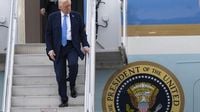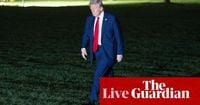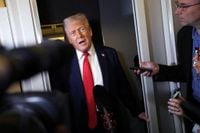Donald Trump has stirred significant controversy by suggesting that serving as president again in 2028 could be considered a fourth term. In an interview with NBC News on March 30, 2025, he claimed, "there are methods" that might allow him to circumvent the constitutional ban on a third term, a notion that has drawn sharp criticism from both sides of the political aisle.
During the interview, Trump expressed his belief that the 2020 election was "rigged," thus framing his potential return to the presidency as a continuation rather than a new term. He stated, "I have had more people ask me to have a third term, which in a way is a fourth term because the other election — the 2020 election — was totally rigged." This assertion has raised eyebrows, particularly because the 22nd Amendment of the U.S. Constitution explicitly prohibits any individual from being elected to the presidency more than twice.
Critics have pointed out the monumental hurdles involved in changing the Constitution. For any amendment to pass, it would require a two-thirds majority in both houses of Congress or two-thirds of the states to convene a constitutional convention, followed by ratification from three-fourths of the states. Texas Congresswoman Jasmine Crockett tweeted, "So, that’s actually not allowed… The Constitution isn’t optional, sir. This isn’t a reality show — it’s reality. Two terms, that’s it."
John Dean, a former White House counsel during the Nixon administration, criticized Trump's aspirations, suggesting that the former president is seeking a way to bypass the clear language of the 22nd Amendment. Dean remarked, "He likes constitutional end-runs... and that’s what seems to be on his mind."
Meanwhile, Trump's comments come amid escalating tensions regarding his foreign policy. He expressed frustration with Russian President Vladimir Putin for the lack of progress on a ceasefire in Ukraine, stating he was "p***** off" with the Russian leader. Additionally, Trump has threatened military action against Iran if a new nuclear deal is not reached, declaring, "there will be bombing. It will be bombing the likes of which they have never seen before."
As these political dramas unfold, the economic landscape is also shifting. Global stock markets reacted negatively to Trump's announcement of reciprocal tariffs on all countries that impose duties on U.S. goods, which he dubbed "Liberation Day". On March 31, 2025, stocks across Asia plummeted, with the Nikkei 225 falling by 4%, the Hang Seng dropping by 1.3%, and South Korea’s Kospi declining by 2.6%. Investors are increasingly worried about the potential for a global trade war, and many fled to gold, pushing its price to a record high of over $3,100 an ounce.
In the U.S., economists have noted a sense of stagflation as Trump's tariffs loom, with Goldman Sachs raising the probability of a recession to 35%. The brokerage has also cut its GDP growth forecast for 2025 from 2.0% to 1.5% amidst fears that Trump's policies could further destabilize the economy.
Adding to the political spectacle, billionaire Elon Musk has been actively participating in the upcoming Wisconsin Supreme Court election, handing out $1 million checks to two attendees at a town hall event to rally support for conservative candidate Brad Schimel. Musk stated, "The reason for the checks is that it’s really just to get attention. It’s like, we need to get attention." His financial backing in the race has reportedly exceeded $20 million.
Despite the controversies surrounding Trump, some Republican lawmakers, like Nebraska Representative Don Bacon, have urged the administration to take a firmer stance against Putin, criticizing Trump's approach as being too lenient. Bacon expressed concern that many Republicans are treating Russia with "velvet gloves" and failing to acknowledge the illegal nature of Putin's actions in Ukraine.
As the political landscape continues to evolve, Trump's remarks about a potential third term and his aggressive trade policies are likely to dominate discussions in the coming days. With the global economy on edge and his approval ratings fluctuating, the implications of his presidency remain a topic of heated debate.
In a poll conducted by the Associated Press-NORC Center for Public Affairs Research, about half of U.S. adults approve of Trump's immigration policies, but only four in ten view his handling of the economy and trade negotiations positively. This suggests that while some aspects of his administration resonate with voters, concerns about economic stability are beginning to overshadow his previous advantages.
As the clock ticks down to Trump's "Liberation Day" tariffs on April 2, 2025, the world watches closely, anticipating the potential fallout from his policies and the continued implications of his presidency on both domestic and international fronts.






